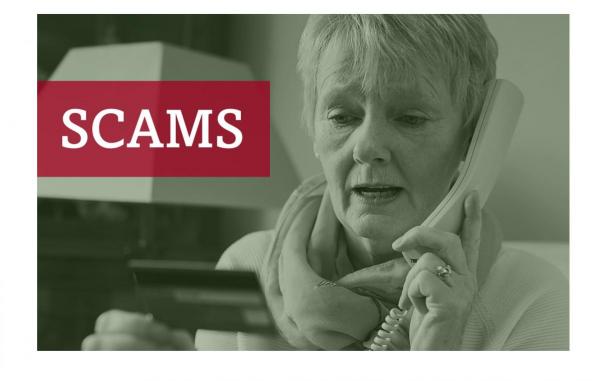Our Advice on Scams
 There are various forms of scams - such as lotteries, prize draws, and investment schemes. Unfortunately, it is difficult to stop the scammers so knowing what to look out for might just stop you from getting sucked in.
There are various forms of scams - such as lotteries, prize draws, and investment schemes. Unfortunately, it is difficult to stop the scammers so knowing what to look out for might just stop you from getting sucked in.
How to Spot a Scam
There are a number of signs to look out for
- Being contacted out of the blue (also known as 'unsolicited') by telephone, post or email
- The offer is too good to be true
- Being asked to pay money up-front or to buy a product in order to claim your prize
- If there is a deadline by which you must claim your prize
- When contacted, if the person calling is overly familiar and friendly with you
- Being asked for your bank account, credit card details or other confidential information
- Being told that you need to keep the offer a secret
If any of this seems familiar you maybe facing or have faced a scam.
General Advice to Avoid Scams
Do Not…
- Enter into conversations with organisations that contact you in an unsolicited manner.
- Respond to unsolicited mails or emails.
- Part with any money, to either pay fees or purchase a product in order to claim a prize. Call a premium rate telephone line.
- Give out any personal information such as banking and credit card details or copies of documents such as your passport or driving licence.
If you have already sent money or provided bank details, please take the following actions:
- Do not send any more money; unfortunately if you have already parted with money it may be very difficult for you to get it back.
- Contact your bank, building society or credit card company and close your account if you have given your details to a third party that you do not know and trust.
If you receive any correspondence that may be a scam or an offer that you are just not sure of, always seek advice before acting.

How do Scams Work?
- Potential scammers will try to catch you unawares; this increases their chance of being able to convince you to part with your money or personal information.
- The organisation will try to make the offer to good for you to refuse; this preys on vulnerable people and people who may be in financial difficulties. Remember - if it seems to good to be true, it probably is.
- Many of these operations ask you to pay a fairly nominal fee or purchase an inexpensive item to claim your prize. This makes it seem as though you have little to lose. But the demand for money does not stop there; you will be asked for more money to cover an increasing list of fees and taxes. Your card details may even be used to draw large amounts of money from your account.
- You are put under pressure to make a decision by only being given a short time frame in which to claim your prize; this affects how much time you take consider the offer, and you are more likely to make the wrong decision.
- By becoming friendly with you, the potential scammer is trying to create a relationship where you are likely to trust the information they are providing you and make you believe you are a winner.
- You cannot win a competition that you have not entered.
- By asking you to keep this offer a secret, you are less likely to talk to family and friends who may point out the problems with the offer, and therefore will not receive the correct advice on how to deal with it.
Report a Scam
To report a scam in the UK, visit the Action Fraud website: www.actionfraud.police.uk
To report an international scam visit the Econsumer website: www.econsumer.gov